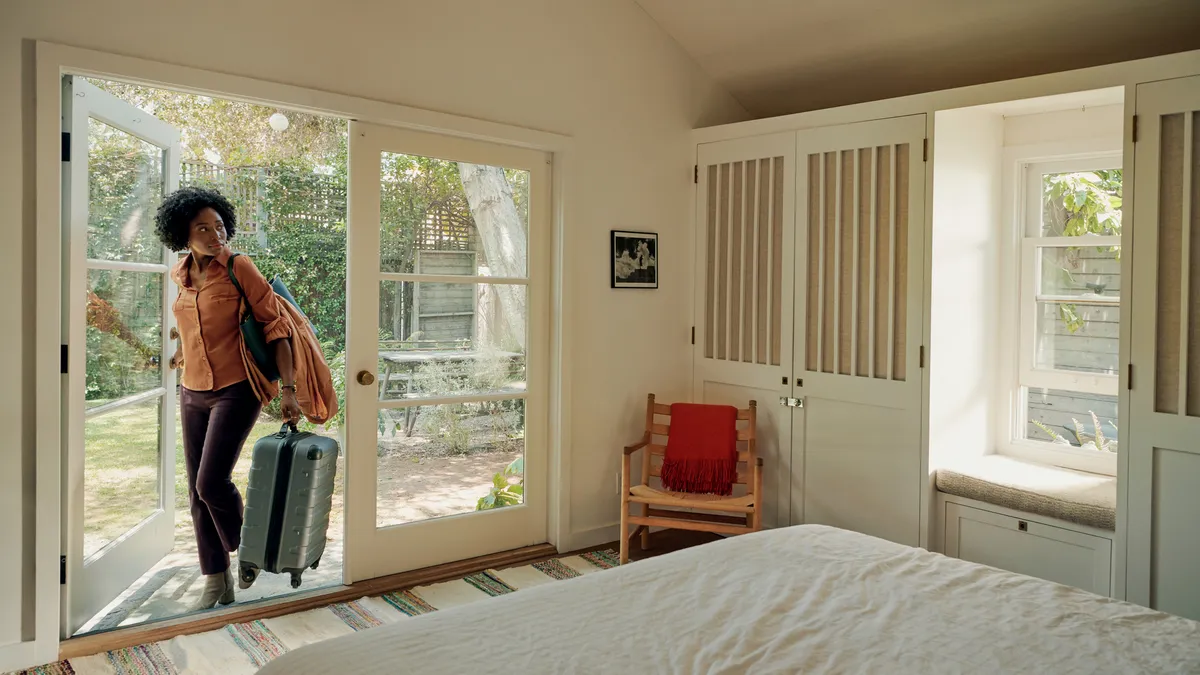Dive Brief:
-
As more of the country receives vaccines and travel restrictions loosen, vacation rental marketplace Airbnb’s revenue grew 5% in the first quarter and its gross booking value rose over 50%, it shared Thursday.
-
The company suffered a triple net loss in the period ending March 27, largely due to debt repayments on loans it took out in the early days of the pandemic. Company CFO Dave Stephenson said it’s uncertain of whether recovery will continue at the same rate in the second half of the year.
- The revenue jump followed the previous quarter’s 22% decline. The company went public on December 10, 2020, with its shares more than doubling in its first day of trading.
Dive Insight:
“We're seeing a very strong, stable listing count [of] 5.6 million,” Stephenson told analysts last week. “One of the things that's been very impressive during this time is that our host churn in Q1 2021 is actually lower than in the same period in 2019, and even lower than in 2020.”
The stable stream of hosts shows the resiliency and stability of Airbnb’s product supply, Stephenson said. “And we're just optimistic that as things continue to rebound, as we continue to educate people about the benefits of hosting ... we'll continue to see a strong host growth going forward.”
When travel rebounds to a more typical state, Airbnb will see overall growth, Stephenson predicts. “People are hesitant to travel right now if they aren't vaccinated, or maybe they can't travel due to some lock-downs. So, we know that many of the trips will be coming back and will be incremental to what we're seeing today.”
The company believes two negative trends will invert this year. “We are going to see a recovery of urban travel and a recovery of cross border,” CEO Brian Chesky told analysts. “This has been our bread and butter before the pandemic, and I think those are significant tailwinds for us.”
Going forward, Airbnb’s product development spend will increase at a lower rate than its revenue, Stephenson said. “We're not going to have to add back a significant number of fixed resources in order to accommodate the business that's back to the size of 2019,” he said. “So, we're going to be very disciplined in any additions to our expenses.”
Airbnb’s urban travel growth rate has increased every month this year, with momentum continuing through April and early May, he said.
To ensure supply matches demand this summer, Stephenson said, the team is doing its best to recruit as many hosts as possible for peak periods in its constrained markets. It’s also revisiting its digital marketing expenses, particularly in markets with a surplus of supply.
“We look at every individual market as different, and we will use different levers to try to manage that balance over time,” he said.
All of the early data for Airbnb’s users acquired during 2020 suggest consistent retention rates with what it had in 2019.
“One of the benefits that we've seen in 2020 is [we’ve lowered the] barrier for entry for new guests to come to Airbnb and try us out for the first time,” he said. “You don't have to hop on a plane. You don't have to go across the border. As we said, over 50% of our nights historically have been cross-border. You don't have to do that to try Airbnb. Now, you can drive just a couple of hours down the road and go check us out. And what we're seeing from the early results is that the retention rates are very consistent with what we've seen in the past.
“We're highly confident that a rebound is going to come,” Stephenson said. “All the early indications are that it's there.”
That said, Stephenson said it can be challenging to precisely pin down how the end of the year will look, but he expects the company’s gross booking value in Q2 2021 to exceed that of Q2 2019, and that its adjusted EBITDA will range from break-even to slightly positive.
The company reported 64.4 million nights and experiences booked in its most recent quarter, a 39% jump from the fourth quarter and a 13% year-over-year jump.












